Global Network Releases Updated List of Highly Hazardous Pesticides
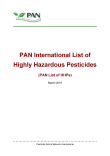 Pesticide Action Network (PAN) International released an updated version of its List of Highly Hazardous Pesticides (HHPs) to coincide with a key meeting in Stockholm of the Strategic Approach for International Chemicals Management (SAICM) process. The expanded list now includes 306 chemicals.
Pesticide Action Network (PAN) International released an updated version of its List of Highly Hazardous Pesticides (HHPs) to coincide with a key meeting in Stockholm of the Strategic Approach for International Chemicals Management (SAICM) process. The expanded list now includes 306 chemicals. These hazardous pesticides (HHPs) threaten people and the environment around the world. The global community must act to stop the continuing exposure of people and the planet to these HHPs. PAN calls on the global community for an internationally binding treaty on pesticides.
PAN International Press Release dated 15.03.2018
European authorities violated own rules to conclude glyphosate is not carcinogenic
New peer-reviewed analysis shows that EFSA and ECHA twice watered down the statistical strength of evidence linking glyphosate with tumour increasesThe European Food Safety Authority (EFSA) and the European Chemicals Agency (ECHA) were only able to conclude that the pesticide active ingredient glyphosate is not a carcinogen by inconsistently applying and even directly violating the applicable regulations and guidelines. This is the outcome of a new peer-reviewed analysis published in the Journal of Epidemiology and Community Health.
The new analysis shows that if the European authorities had properly applied their own benchmarks and "weight of evidence" approach, they would have inevitably concluded that glyphosate is carcinogenic. The analysis includes a science-based rebuttal of ECHA's claim that it adequately addressed concerns about how it applied statistical analyses and the weight of evidence approach.
Press Release dated 14.03.2018
Antibiotics in Livestock Farming. What can be done to reduce environmental threats and avoid the development of antibiotic resistance?
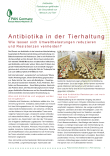 The use of antibiotics in intensive livestock farming promotes the development of antibiotic resistance and the spread of resistant bacterial strains. The livestock industry has a special responsibility in the fight against antibiotic resistance and against the environmental impacts of veterinary pharmaceuticals. The background paper gives an overview on the issue, shows that pharmaceutical residues have become a global environmental problem and highlights the need for a change in animal production.
The use of antibiotics in intensive livestock farming promotes the development of antibiotic resistance and the spread of resistant bacterial strains. The livestock industry has a special responsibility in the fight against antibiotic resistance and against the environmental impacts of veterinary pharmaceuticals. The background paper gives an overview on the issue, shows that pharmaceutical residues have become a global environmental problem and highlights the need for a change in animal production. On International Day of No Pesticide Use, PAN International Urges Move Towards Agroecology
December 3, 2017
December 3 is the anniversary of the worst peacetime chemical disaster in history. Twenty-seven tons of lethal gases leaked from Union Carbide's pesticide factory in Bhopal, India on this date in 1984, immediately killing thousands of people and poisoning half a million others. Pesticide Action Network (PAN) International, which marks its 35th anniversary this year, is a global organization with five regional centers around the world. PAN honors the memory of the Bhopal victims every year with an international "Day of No Pesticide Use," an annual reminder that agricultural chemicals are harming communities around the world every day.
PAN International Press Release dated 03.12.2017
Instead of a phase-out Glyphosate was approved for another 5 years in the EU! On Monday, 27 November 2017, at the appeal committee of EU governments, a qualified majority of Member States voted in favour to the Commission's proposal to renew glyphosate authorisation for 5 years. Despite over a million of European Citizens asking to ban glyphosate, and the European Parliament proposing to phase-out its use in agriculture and place immediate bans for certain uses that result in higher risk, 18 Member States voted to keep this pesticide in the market for another 5 years. more
Further information, reports and publications about Glyphosat can be found in our database
543 organisations in 110 countries signed the Appeal against hazardous pesticide!
moreWhy this Appeal? more (pdf-file)
What are Highly Hazardous Pesticides (HHPs)?
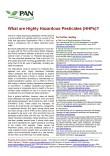 Meanwhile more than a decade ago an international UN-level debate about a 'progressive ban of highly hazardous pesticides' (HHPs) was started - however, without defining the term 'highly hazardous pesticide' clearly.
Meanwhile more than a decade ago an international UN-level debate about a 'progressive ban of highly hazardous pesticides' (HHPs) was started - however, without defining the term 'highly hazardous pesticide' clearly. The global Pesticide Action Network (PAN) – supported by more than 500 organisations from more than 100 countries fights for a ban of such pesticides, and PAN was the first organisation globally defining this term. The PAN International List of Highly Hazardous Pesticides shows which pesticides are highly hazardous and it explains how the list was generated by PAN.
For all those, who are interested in this important topic but who didn’t have the time to learn a bit more about the issue, we have published a 1-pager for a quick view at this issue. Download
PAN International List of Highly Hazardous Pesticides
What are "highly hazardous pesticides"? Here you can ´download the 'PAN International List of Highly Hazardous Pesticides'. This is the December 2016 version.Endocrine disrupting biocides - Why highly hazardous biocides must be phases out
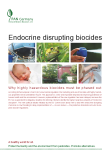 The background paper explains why the EU Commission has delayed the evaluation and regulation of potential endocrine disruptor biocides despite the clear legal EU-provisions. A PAN Germany investigation highlights that more than 10 percent of biocides shows endocrine-disrupting properties. Affected are, for example several active substances in wood preservatives and household insecticides.
The background paper explains why the EU Commission has delayed the evaluation and regulation of potential endocrine disruptor biocides despite the clear legal EU-provisions. A PAN Germany investigation highlights that more than 10 percent of biocides shows endocrine-disrupting properties. Affected are, for example several active substances in wood preservatives and household insecticides. Download (pdf-Datei, 3 MB)
Tweets von @PANGermany
Stop Pesticide Poisonings! A time travel through international pesticide policies
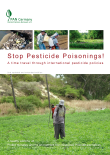 A third updated and extended edition of the popular PAN Germany publication "Stop Pesticide Poisonings - A time travel through international pesticide policies" is now available.
A third updated and extended edition of the popular PAN Germany publication "Stop Pesticide Poisonings - A time travel through international pesticide policies" is now available. Download (pdf-file, 745 kb)
Field Guide to Non-chemical Pest Management in Orange Production
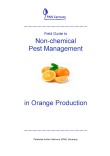
PAN Germany has published the sixteenth field guide in a series on non-chemical pest management in the tropics. These (apart from two) crop specific field guides focus on just one crop and deal with all relevant information on how to manage agricultural pests (e.g. insects, mites, diseases) without using chemical pesticides.
Download (1,587 MB)Further Field Guides
Ecological Impacts of Veterinary Pharmaceuticals: More Transparency - Better Protection of the Environment
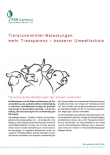 In the context of the revision of veterinary medicinal products legislation that is currently underway, this background paper focuses on three measures that would contribute to making information on the occurrence of veterinary drugs in the environment and their eco-toxicological effects more widely available and enhance protection of the environment from contamination with veterinary pharmaceuticals: Introduction of a monograph system, introduction of a monitoring system for pharmaceuticals in the environment, and the revision of the pharmacovigilance system for reporting negative effects on the environment.
In the context of the revision of veterinary medicinal products legislation that is currently underway, this background paper focuses on three measures that would contribute to making information on the occurrence of veterinary drugs in the environment and their eco-toxicological effects more widely available and enhance protection of the environment from contamination with veterinary pharmaceuticals: Introduction of a monograph system, introduction of a monitoring system for pharmaceuticals in the environment, and the revision of the pharmacovigilance system for reporting negative effects on the environment.
The EFSA Conclusion on the Peer Review of the Glyphosate Risk Assessment - A Reality Check
The 31 August 2015 Addendum to the Renewal Assessment Report on Glyphosate - A critical analysis
The Glyphosate Renewal Assessment Report - An Analysis of Gaps and Deficiencies
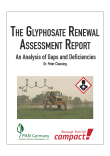
Download (revised version, pdf-Datei, 696 kb)
© 2018 PAN Germany Seitenanfang PAN Germany, E-Mailvalidieren

